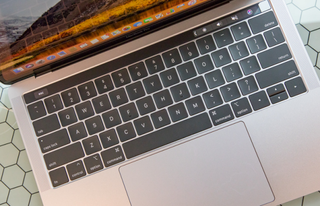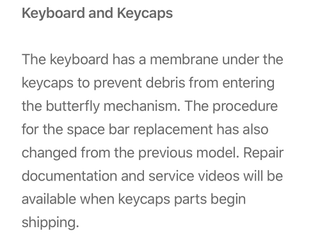How the New MacBook Pro Solves Apple's Keyboard Problem
It looks like Apple's new MacBook Pro keyboard isn't just quieter: it's also more reliable.
According to leaked documents, the third-generation Butterfly-style keyboards in the 2018 MacBook Pros feature a design change intended to block debris and protect your typing.

The new keyboards feature a thin, rubberized membrane layer, which was first revealed by iFixit on July 13, in a post that claimed "Apple’s new quieter keyboard is actually a silent scheme to fix their keyboard reliability issues." But while that post was mere conjecture, an internal Apple document obtained by MacGeneration provides evidence that the keyboard is more reliable.
MORE: 2018 MacBook Pro Benchmarked: This Is the Fastest SSD Ever
The shared snippet of that document notes "The keyboard has a membrane under the keycaps to prevent debris from entering the butterfly mechanism." It also states that "the procedure for the space bar replacement has also changed from the previous model," which reminds me of how I've seen colleagues frantically trying to click their space bar into working again.

The document published by MacGeneration matches the fonts that Apple uses, and the idea of a membrane that protects against crumbs and other detritus is reflected in an Apple patent published on March 8. Specifically, the patent referenced that the membrane would "block passage of contaminants into the apertures."

Credit: U.S. Patent and Trademark Office
Stay in the know with Laptop Mag
Get our in-depth reviews, helpful tips, great deals, and the biggest news stories delivered to your inbox.
If you're wondering why Apple wouldn't publicly boast that its latest laptops feature more-reliable keyboards, the most likely answer is protecting its legal liability. Apple is currently facing dual class-action lawsuits (1, 2) that accuse the company of being aware of the failure rates in its keyboards.
We've reached out to Apple for comment, and will update this story if we get a response.
